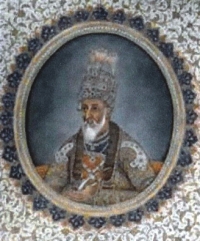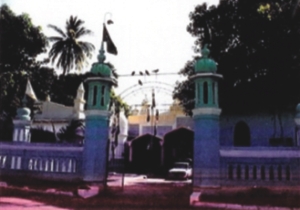|
Heritage
The Last Timurid Emperor
Bahadur Shah Zafar's Tragic End
Azizul Jalil
 Emperor Bahadur Shah, a man of eighty-two years, looking tired, came out slowly. He cried out "Hodson sahib, can you repeat from your own lips, the Company's promise about the safety of my life?" Hodson repeated the assurance, whereupon the Badshah saluted him. The British Captain had come to secure Bahadur Shah's surrender. His favourite wife, nawab Zinat Mahal had already negotiated the terms of the surrender, under which the Emperor and a few of his chosen relatives would be spared and would not suffer any indignity. Earlier, Bakht, one of the rebel leaders had come with sepoys to the Humayun's tomb where the Emperor had taken refuge after the British recaptured Delhi. He tried to persuade the Emperor to accompany them as they were fleeing, having lost Delhi to the British. Bahadur Shah, a highly acclaimed poet, was vacillating. A palki was kept waiting but Zinat Mahal and others in the family prevailed upon the Emperor to give up the idea. Bahadur Shah, who at the beginning of the Sepoy Mutiny in May 1857 had assumed its leadership, then told Bakht that he could no longer rely on the mutineers, as they were losing the battle and on the run. He said he had decided to put his fate in the hands of the Almighty. Emperor Bahadur Shah, a man of eighty-two years, looking tired, came out slowly. He cried out "Hodson sahib, can you repeat from your own lips, the Company's promise about the safety of my life?" Hodson repeated the assurance, whereupon the Badshah saluted him. The British Captain had come to secure Bahadur Shah's surrender. His favourite wife, nawab Zinat Mahal had already negotiated the terms of the surrender, under which the Emperor and a few of his chosen relatives would be spared and would not suffer any indignity. Earlier, Bakht, one of the rebel leaders had come with sepoys to the Humayun's tomb where the Emperor had taken refuge after the British recaptured Delhi. He tried to persuade the Emperor to accompany them as they were fleeing, having lost Delhi to the British. Bahadur Shah, a highly acclaimed poet, was vacillating. A palki was kept waiting but Zinat Mahal and others in the family prevailed upon the Emperor to give up the idea. Bahadur Shah, who at the beginning of the Sepoy Mutiny in May 1857 had assumed its leadership, then told Bakht that he could no longer rely on the mutineers, as they were losing the battle and on the run. He said he had decided to put his fate in the hands of the Almighty.
Captain Hodson demanded that the Badshah give up his arms before journey to Lal Qilla (Red Fort) in Delhi, a distance of about four miles. Bahadur Shah then handed over the two ceremonial swords he was carrying-one with the name of Nadir Shah and the other with the name of Jahangir, etched on these. At that moment, he became the ex-emperor.
With Hodson and thirty Sikh horsemen guarding, the Palki carrying Bahadur Shah went towards Delhi, at a walking pace, while hundreds of mournful villagers watched and accompanied the procession. Bahadur Shah was detained at the Red Fort. In the Delhi Book of Thomas Metcalf, Metcalf has reprinted a persian poem written on April 29, 1844 by Bahadur Shah Zafar, who was already in a pensive mood. He spent some time in the court of the Emperor, who gave him the poem as a sign of friendship. Metcalf's English translation reads:
A Friend is he, who proffers Friendship's hand
When care or grief our kindred feelings claim.
Not he whom prosperous days alone command
And is a Friend or Brother but in name.
In 1854, three years before the Sepoy Mutiny, the British had informed the Emperor that the Great Mugal Empire would be abolished after his death. Regarding the problem of succession, a dejected Bahadur Shah Zafar wrote:
Oh Zafar, it is just up to you these affairs of the State
After you there shall be no successor and no affairs of State.
When this verse came out, the residents of Delhi were quite upset and the verse was sung in the streets like a lament.
 A British military commission tried Bahadur Shah at Delhi, the last of the Timurids (descendents of Timerlane) who sat on the throne of India as Mugal Emperor, for treason and complicity to murder. He was found guilty and banished to Rangoon (Yangon) in Burma (Myanmar). Some family members accompanied him. In the British Library, there are manuscripts and other documents by eyewitnesses and contemporaries on the arrest of Bahadur Shah, his journey to Rangoon, and his days in captivity. Amongst these are Captain Hodson's hand written account of Bahadur Shah's surrender to the British and the Jailor's reports on Bahadur Shah's life in Rangoon. A British military commission tried Bahadur Shah at Delhi, the last of the Timurids (descendents of Timerlane) who sat on the throne of India as Mugal Emperor, for treason and complicity to murder. He was found guilty and banished to Rangoon (Yangon) in Burma (Myanmar). Some family members accompanied him. In the British Library, there are manuscripts and other documents by eyewitnesses and contemporaries on the arrest of Bahadur Shah, his journey to Rangoon, and his days in captivity. Amongst these are Captain Hodson's hand written account of Bahadur Shah's surrender to the British and the Jailor's reports on Bahadur Shah's life in Rangoon.
The journey of the prisoners to Rangoon took about two months. It began first by land to Allahabad, then by boat to Khulna and Diamond Harbour near Calcutta. There they took a steam ship to Rangoon. The British jailor recorded the arrival and the fact that the prisoner, whom he describes as the 'ex-King of Delhi, and his companions had first to be accommodated in tents. A house made of teak wood on a raised platform with four rooms was built soon. Bahadur Shah and Zinat Mahal had two separate rooms of sixteen fts, each with attached baths. Two of his sons occupied the other two rooms. A few male and female attendants who came with them from Delhi were housed separately. Other than these people, no other contacts or visits were permitted. A six-monthly report on the prisoners' condition was sent to the Commissioner of the region. In these reports, the jailor reported that the weekly food cost was 11 rupees. For Sundays, an extra rupee would be added and there was an allowance of two rupees given at the beginning of each month for purchase of toiletries. While his middle-aged wife remained in good health, the aged Emperor lost his teeth, and was in poor health. Towards the end, he was sometimes disoriented and due to articulation problems, could not be easily understood. In the final days, he had problems swallowing his food and could only take broth with difficulty. Bahadur Shah died on November 7, 1862 at the age of eighty-seven. He was buried near Shwe Degon Pagoda, Yangon.
The British jailor recorded that Bahadur Shah was buried on level ground covered with turf. Wooden fence was put up so that when the fence disintegrates, and grass covers the grave, there will be no telling where the ex-emperor was buried. The British plan came to nothing. The memory of a great poet and the last Mughal Emperor of India could not be erased from people's mind. The grave site has become Bahadur Shah's Dargah. In 1938, the road in front was named Zafar Shah Road. Many people from the Indian sub-continent, including heads of governments of India, Pakistan and Bangladesh, have visited it to offer respect and prayers. Bahadur Shah Zafar remembered his motherland to the last breath. He wrote his own epitaph in deep sorrow at the prospect of burial abroad. An English translation reads:
My heart is not happy, in this barren land
Who has ever felt fulfilled in this temporary world.
Please tell my emotions to go away somewhere else
There is not enough room for them in my sad heart.
I had requested for a long life, a life of four days
Two were spent in praying and two were spent in waiting.
How unlucky Zafar is!
For burial, even two yards of land were not to be had in the land of the beloved.
(Azizul Jalil writes from Washington.)
Copyright
(R) thedailystar.net 2005
|
